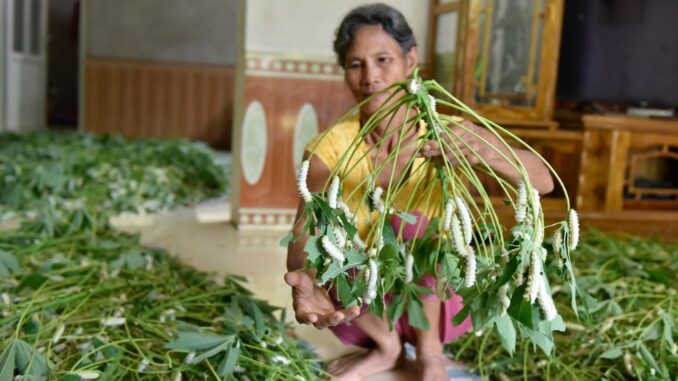
Farmers in the mountainous Thanh Hoa are in the main season of raising silkworms and cassava leaves for food, with some households earning nearly 100 million VND per season.

A cassava field in Ba Thuoc district. Cassava is grown in many mountainous districts of Thanh Hoa such as Cam Thuy, Ba Thuoc, and Thach Thanh…, mainly for starch processing to make instant noodles or animal feed. From March to September, cassava leaves are used by farmers to raise silkworms.
Mr. Luong Van Tuan, deputy head of Hong Son village, Canh Nang town, Ba Thuoc district, said that in the village, there are nearly 30 households raising cassava silkworms, including thousands of households in the district. “Silkworm rearing helps people have a stable income because there is no money to buy food, the rearing process is simple and the breed is short-term,” said Tuan.

Pham Thi Hong’s family, in Hong Son street, Canh Nang town, is one of the households that raise the most silkworms in the locality. Planting 2 hectares of cassava, mainly selling tubers to the factory at the end of the year, when the cassava plant is at the leaf development stage in the summer, Ms. Hong takes advantage of the leaves to feed silkworms.
Every day, Ms. Hong and her husband go to the garden in front of the house to break cassava leaves to make food for the silkworms who are eating well.

Ms. Hong said that silkworm farming has existed for a long time, but in the past, it was mainly for food for the family. For about three years now, due to great market demand, Ba Thuoc people have expanded to mass-cultivate and sell commercial products.
“Raising this silkworm does not cost money to buy food, and the investment is not significant …”, Ms. Hong said and said that each year the family raises nearly 20 litters, each batch lasts 15-18 days, with an income of 50. -70 million dongs.

The cassava silkworm variety is obtained from a breeding facility in Phu Tho with the price of 500,000-800,000 VND per ounce of eggs, which can reach one million VND at peak times. Farmers then incubate in small trays, 3-4 days later silkworms will hatch. Just hatched, small silkworms know how to eat and grow very quickly.

Mr. Nguyen Van Tho (35 years old, in Canh Nang town) is taking care of newly hatched silkworms nearly a week ago. “Food for newly hatched silkworms often has to choose young cassava leaves or plain cakes, old leaves are too difficult to eat and slow to grow,” Tho shared his experience.

The main season is around mid-August, and Mr. Tho’s family takes advantage of both the level 4 floor and the kitchen to raise silkworms. Farmers often spread tarpaulins on the floor to prevent silkworm droppings from clinging to causing unsanitary conditions.
The cycle of a commercial silkworm litter usually lasts 15-18 days, so after every litter, farmers have to clean and disinfect once.

“Raising cassava silkworms does not need sophisticated techniques, mainly with adequate feeding, they will grow evenly…”, 65-year-old Nguyen Thi Nhu said.
According to Ms. Nhu, cassava silkworms also sometimes get sick, sometimes losing everything, but the rate is not much. Silkworms often suffer from fungal diseases or if the weather is too hot, they will die, so experienced farmers often choose a cool location, when it is hot, they have to turn on the fan to get wind for the silkworms.

Tapioca silkworms usually eat well around the 12th day after hatching and last until ripe. This is the time when the farmer has the hardest time. In order to raise nearly one ounce of seed eggs, at this time, Ms. Hong has to mobilize two human resources to collect leaves all day long to feed silkworms. “The cassava leaves must be taken when it is dry, if the silkworms eat it, they will catch cold and die,” added Ms. Hong.

Two children in Canh Nang town take advantage of the summer days before school to help their parents harvest ripe silkworms.

Ripe silkworms will have traders come to the house to buy, then bring them to big cities like Hanoi, Hai Phong, Thanh Hoa… to sell to restaurants. The price of silkworms currently fluctuates from 70,000-80,000 VND/kg.
According to people, two years ago, due to the impact of the Covid-19 epidemic, silkworm prices dropped, but this year the price has stabilized, at the beginning of the crop up to 120,000 VND/kg still no goods for sale.

Cassava silkworm is an insect rich in protein, fat and contains many vitamins (A, B1, B2, PP, C), minerals (especially calcium and phosphorus). According to oriental medicine, silkworms are ripe with salty, fatty, fragrant, warm properties, used as a nerve tonic, for people who eat and sleep poorly, children with slow growth, women after giving birth with little milk, and weak bodies. …
Cassava silkworm is mainly processed and roasted, served with apricot leaves, guise leaves or fig leaves.
